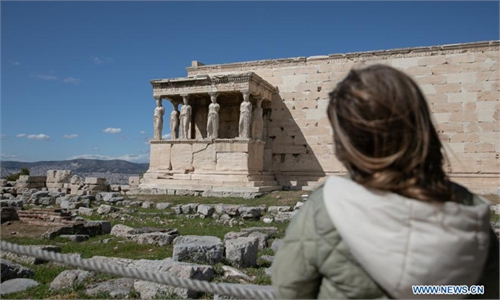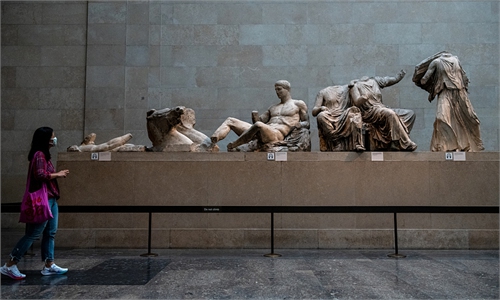IN-DEPTH / IN-DEPTH
Greece relishes transparent Chinese investment, looks forward to stronger future partnership: Ambassador
Fusion Millennia
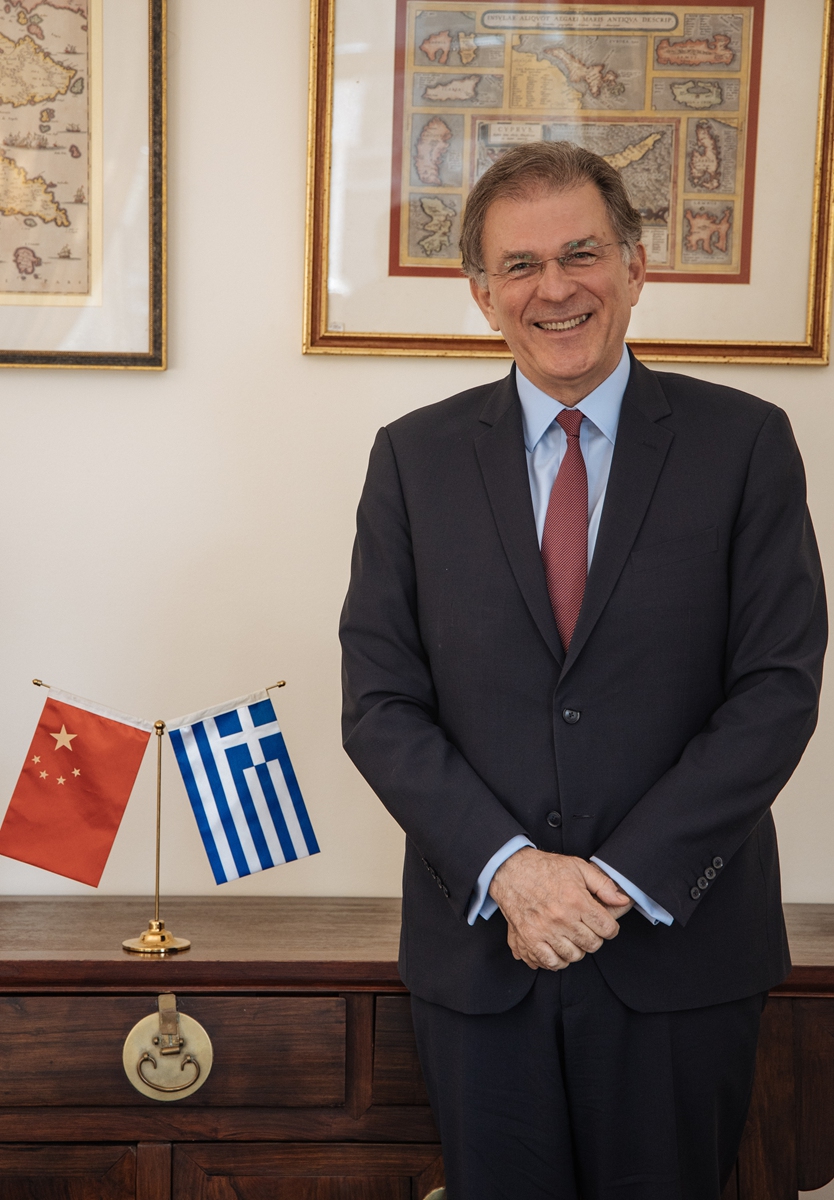
Greek Ambassador to China Georgios Iliopoulos Photo: Li Hao/GT
Editor's Note:
March 25 marks the 200th anniversary of Greek Independence Day. This year also marks the Greece-China Year of Culture and Tourism. China and Greece enjoy cordial relations which benefit both countries despite attacks from some politicians. On this special occasion, Global Times reporter Xie Wenting (GT) talked with Greek Ambassador to China Georgios Iliopoulos (Iliopoulos) on bilateral relations, the upcoming Winter Olympics, China's investment in the country, and many other topics.
GT: This year marks the 200th anniversary of Greek Independence Day. What activities will the Greek Embassy in China host to celebrate this special occasion? From your point of view, what is the most important lesson that Greece has drawn from the past 200 years that can be shared with China?
Iliopoulos: This year is special for Greece. It marks the 200 years of Greece's revolution and independence and the creation of the Modern Greek state, the first nation-state in the history of Europe at the beginning of the 19th century, in an era of multi-ethnic empires. This was a development, often unnoticed or underestimated by historians and experts focusing on the great powers of that era, that in many ways accelerated the course of global history and provided, and most importantly put in practice, novel ideas. Many of them derived from the European and Greek Enlightenment, which we often hear and talk about today: national sovereignty, constitutionalism, internationalism, multilateralism, global governance, and even that of humanitarian intervention.
The year 2021 also marks the Greece-China Year of Culture and Tourism which is going to open in Athens on May 20. Despite the formidable challenges presented by the pandemic and continuing safety measures such as quarantines, we aspire to showcase to China the historical richness and cultural resilience of Greece and its acclaimed tourism resources.
We do hope that this year will bring potentially numerous benefits for both countries. For Greece, there are obvious benefits of potential tourism growth. We welcomed roughly 160,000 Chinese travelers, according to 2019 numbers, a small number compared to the more than 150 million Chinese tourists who traveled abroad just before the pandemic. We also hope that the year will enhance and solidify Greece's national image in China and the country's cultural and economic resilience after the two most recent crises we have been through. Greece through the tremendous sacrifices of its people managed both to contribute to the unity of Europe and the Eurozone in the past debt crisis and provide a hailed model for fighting the pandemic with one of the best records in the EU. We also hope that, despite the pandemic, this year will be beneficial, in terms of deepening interpersonal exchanges. We do hope that this celebration will enhance our cooperation with China through the wider use of new digital technologies, in terms of holding forums and teleconferences through the internet, arranging similar offline events and exhibitions, enhancing our presence in Chinese film festivals and film panorama activities, etc.
GT: This year also marks the 100th anniversary of the founding of the Communist Party of China (CPC). Based on your own observations, how do you evaluate China's development in the past and the role that the CPC plays in China's development?
Iliopoulos: The development of China over the recent period, especially over the last 30 years has been remarkable.
We usually see things through our own lenses and comparing is not always right, but when it comes to China's modern history with that of Greece, this may be justified: despite the geographical distance and huge difference in terms of land and population in our countries, we have important and impressive parallels and traits. And they can be reflected upon and often admired as achievements of both.
We are both countries with splendid, millennia-old cultures that exerted huge influence in the Western world and that of the East, and at the same time, often through fierce debates, we managed to modernize while retaining our national essence and culture. Both our nations fought for national sovereignty and resisted successfully against foreign encroachment.
Most importantly, we both expressed a spirit of resilience which as I have often said is embedded in our DNAs and this was most recently evidenced in our common efforts to fight the COVID-19 pandemic.
Evidently, education is of utmost importance and I personally hope to see more comparative academic research as well as cultural exchanges and events regarding the recent histories of our countries and their parallel trajectories.
As regards the role of CPC in China's recent history, I usually focus on the improvement in people's living standards and lifting almost 800 million people out of poverty. This has been a remarkable achievement. Yet, huge challenges remain, on a societal and economic level such as, expanding the rule of Law, protecting effectively the environment, mitigation income inequalities and accumulating debt and opening up more China's economy rendering it more reciprocal in terms of trade etc.
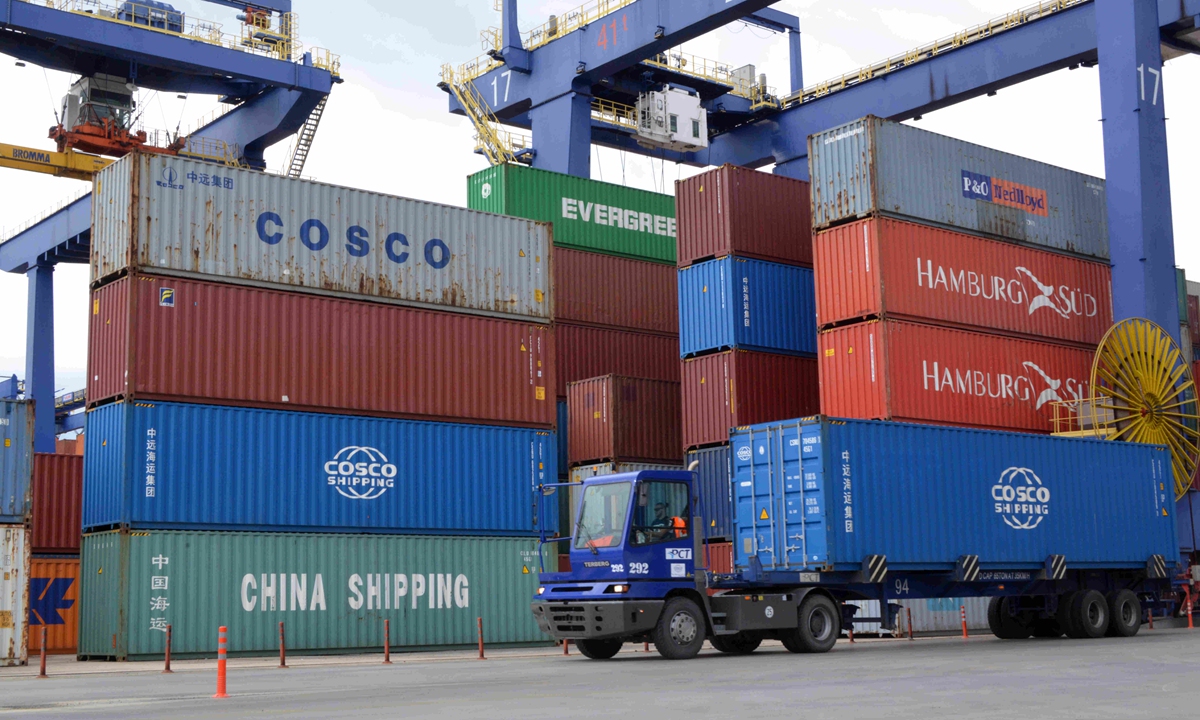
Port of Piraeus Photo: cnsphoto
GT: In what areas can Greece and China further increase cooperation in terms of economy and investment? How is the situation regarding Chinese projects in Greece amid the pandemic, especially the Port of Piraeus?
Iliopoulos: The year 2020 was a year full of many and important challenges that have served, nevertheless, as pointers regarding the growth of our relations in the future. These challenges, including the COVID-19 pandemic and the emanating global economic crisis, have shown us ways to turn the crisis into an opportunity, spur growth and mitigate its effects. It has a lso been a year of close and effective collaboration between Greece and China against the pandemic, including procuring medical equipment, handing of Chinese donations to Greece, and exchanging information. It has also demonstrated how our cultural strengths, including a shared sense of unity in the face of danger and the mobilization of our collective wisdom and spirit during these challenging times, have greatly assisted both our societies and countries to defend ourselves against these challenges.
Greece, being at the forefront of the European integration process and an important pillar of peace, security, stability, and prosperity in its region, is looking forward to closer and stronger ties with China, with new synergies and partnerships aiming for growth.
The investment of China Ocean Shipping (Group) Company (COSCO) in Piraeus Port has been acknowledged as one of the most successful foreign investment projects in Greece over the last 13 years. It provided substance and most importantly an impetus for further growth in the Greece-China relationship. It was also an important vote of confidence toward the Greek economy during those difficult years of the financial or debt crisis. COSCO's acquisitions and its growing success have come from what is in my mind a very logical partnership with China. During the pandemic, COSCO and OLP (Piraeus Port) have performed remarkably well.
COSCO's investment has rendered Piraeus the top port in the Mediterranean, one of the biggest port hubs. We are looking forward to seeing all projects and requirements fulfilled on the part of COSCO in terms of this Master Plan, something that is a precondition for the enhancements of its share to the level of 67 percent as pre-agreed. Regarding other not pre-agreed projects such as the construction of Terminal IV (an investment of 300 million euros that will allow Piraeus Port to grow further with a capacity of 2.8 million TEUs annually) we need to conclude the evaluation at the same time of its impact on local business interests and we are hopeful a win-win situation may emerge.
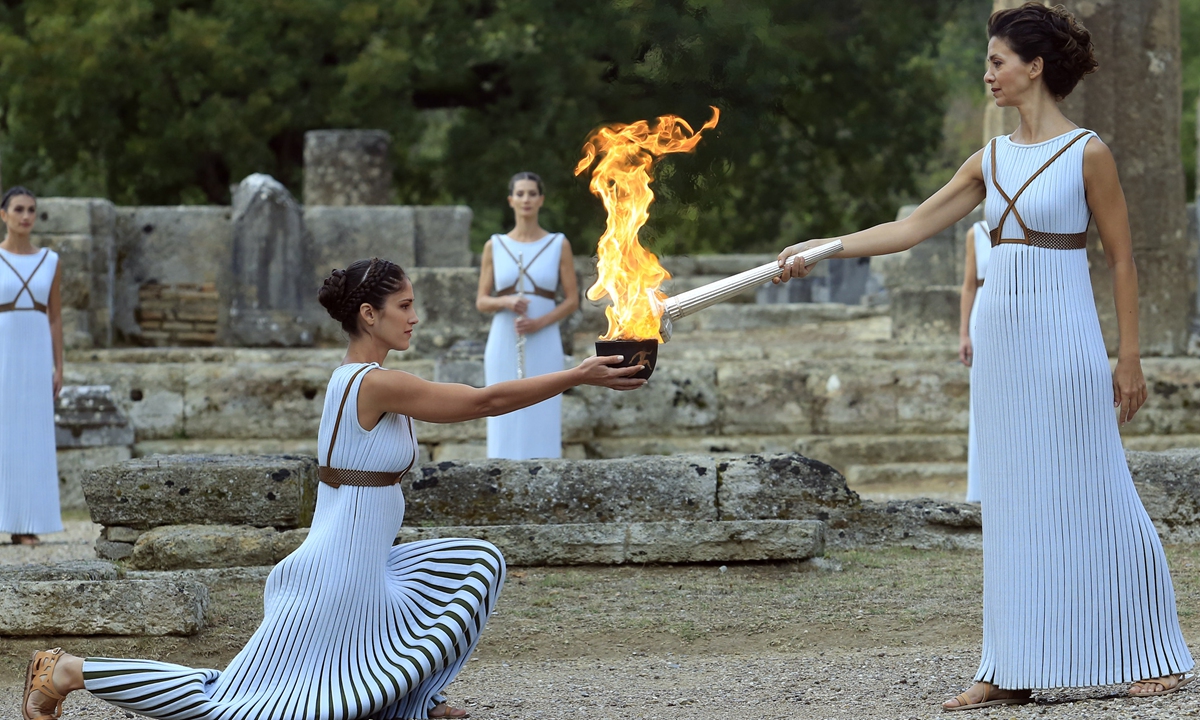
High priestess passes the Olympic flame during a lighting ceremony of the Olympic flame in ancient Olympia on October 24, 2017. Photo: VCG
GT: Is Greece cooperating with China for the upcoming 2022 Winter Olympics? If so, could you elaborate more on this cooperation? There have been calls to boycott the 2022 Winter Olympics. What's your take on this?
Iliopoulos: In the realm of cultural ties between our countries, the Olympic cooperation holds a very significant place. Not far from today, the most significant event that marked our relations was the successive organization of the Athens and Beijing Summer Olympic Games in 2004 and 2008 respectively.
The hosting of the 2008 Olympics in Beijing right after the Games in Athens opened up numerous channels of communication and cooperation between our countries, enhanced mutual trust and respect, and decisively shaped the image of Greece in China as the cradle of Western civilization and the birthplace of the Olympics.
We can recall that the lighting of the Olympic Flame in Ancient Olympia in 2008 offered a most propitious moment for the image of Greece in China throughout all these years with a significant impact beyond the realm of culture.
Early next year, Beijing will host the Winter Games. This is the second time Beijing will host the Games as Athens did in 2008 after the first Modern Olympics in 1896. We have happily noticed relevant news and announcements by China's leaders recently regarding the ongoing preparations and the promise to deliver the most successful Winter Olympics early next year.
We are truly looking forward to this. Greece and China will come ever closer by cooperating again for the lighting ceremony in Ancient Olympia, the torch relay, and the handing of the Flame to the Beijing Winter Games Organizing Committee next autumn in Athens. We also hope that during the Olympics, despite the pandemic, it will be possible to organize related events such as an Olympic exhibition with archaeological relics (as we did in 2008), forums, and photography exhibitions regarding the 1896 Games, etc.
We are always proponents of spreading the message of the Olympics that is centered on noble competition, international cooperation through the International Olympic Committee and local or national bodies. We of course ardently support the idea of Olympic Truce and all ramifications of this important concept derived from antiquity: peace, solidarity, and mitigation of antagonisms.
We sincerely wish the Beijing Winter Games a great success!
GT: China-Greece relations are attacked by some politicians and media outlets, as some express concerns that Greece is increasingly leaning toward China. What are your thoughts on these opinions?
Iliopoulos: No one chooses to find oneself under crossfire. Our stance toward further developing economic relations with China is based on the long-term development strategies of Athens and its multi-dimensional foreign policy. Greece sees its relationship with Beijing not as an antagonistic one, but as a complementary one to those it has, say, with the US or the EU and other Western allies. Greece does not see any conflict in its EU membership and its close ties with its Western allies on one hand, and in keeping our openness to Chinese investment and trade relations with China on the other.
After all, so far, Chinese investments have not failed to regard the local conditions and labor markets, but rather have been carried out with transparency and have led Greek public opinion to look at them favorably, largely thanks to their apparent success and assistance extended to Greece during the past dire times of economic crisis.
We do hope that this investment trend will resume strongly after the pandemic and as I noted before will include more investments in more novel sectors including manufacturing & industry, agri-foods, the health and pharmaceutical sectors, and tourism infrastructure, etc.
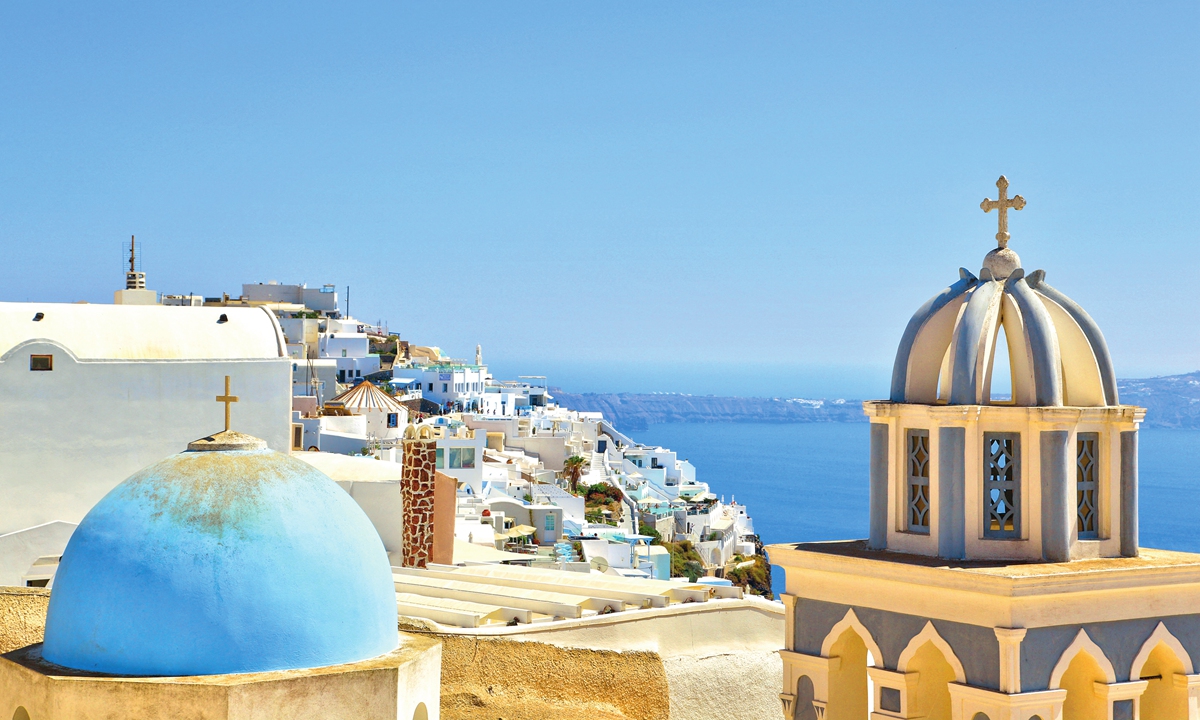
Santorini, Greece Photo: VCG
GT: China plans to roll out vaccine passports with an aim to revive foreign travel. Will Greece accept China's vaccine passports? Why? How do you evaluate the role that China plays the global vaccine distribution?
Iliopoulos: The vaccination "passport" has been a very important idea firsty introduced by the Greek Prime Minister within the framework of the EU.
The "passport" is not intended to become a tool of discrimination, but rather a means of facilitation, and a first step to the return to normalcy.
We need to agree, when it comes to the essence of COVID-19 policies, that living in a globalized world means that no one is safe until everyone is safe. In the framework of this health crisis, vaccines are probably the most powerful weapon we have. And with respect to the free market economy and the motivation investors and researchers need, governments must ensure that vaccines are made available to all at an affordable price.
GT: Chinese netizens showed support for Greece's request for the UK to return Parthenon relics. What are your thoughts on this?
Iliopoulos: We have happily noted the surge of sympathy toward Greece's just cause for the return of the illegally (and destructively of course not only in terms of distorting the cultural and aesthetic continuity and integrity of the emblematic monument but also in terms of physically damaging or losing at the bottom of the Sea, part of the Marble) obtained Parthenon Marble sculptures from the British Museum among Chinese internet users.
This is a tale of two nations and a tale of two Elgins if I may put it in this way, as Elgin and his son committed these acts of destructions and vandalism first in the Acropolis and then in Yuanmingyuan.
Greece and China signed an Agreement in 2008 for the protection of cultural relics including their illicit trade. Greece is at the forefront of global efforts for the protection of cultural monuments from climate change. Greece also initiated 2017 the Ancient Civilizations Forum (ACF) initiative actively embraced by China. In this context, we are actively cooperating with China and with seven other nations so as to promote the cause of cultural heritage and monument protection, and advancing the sustainability of our culture economies.
